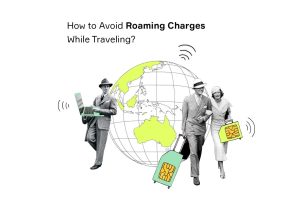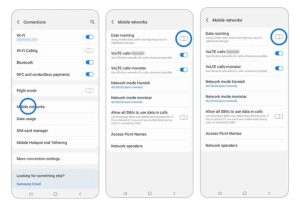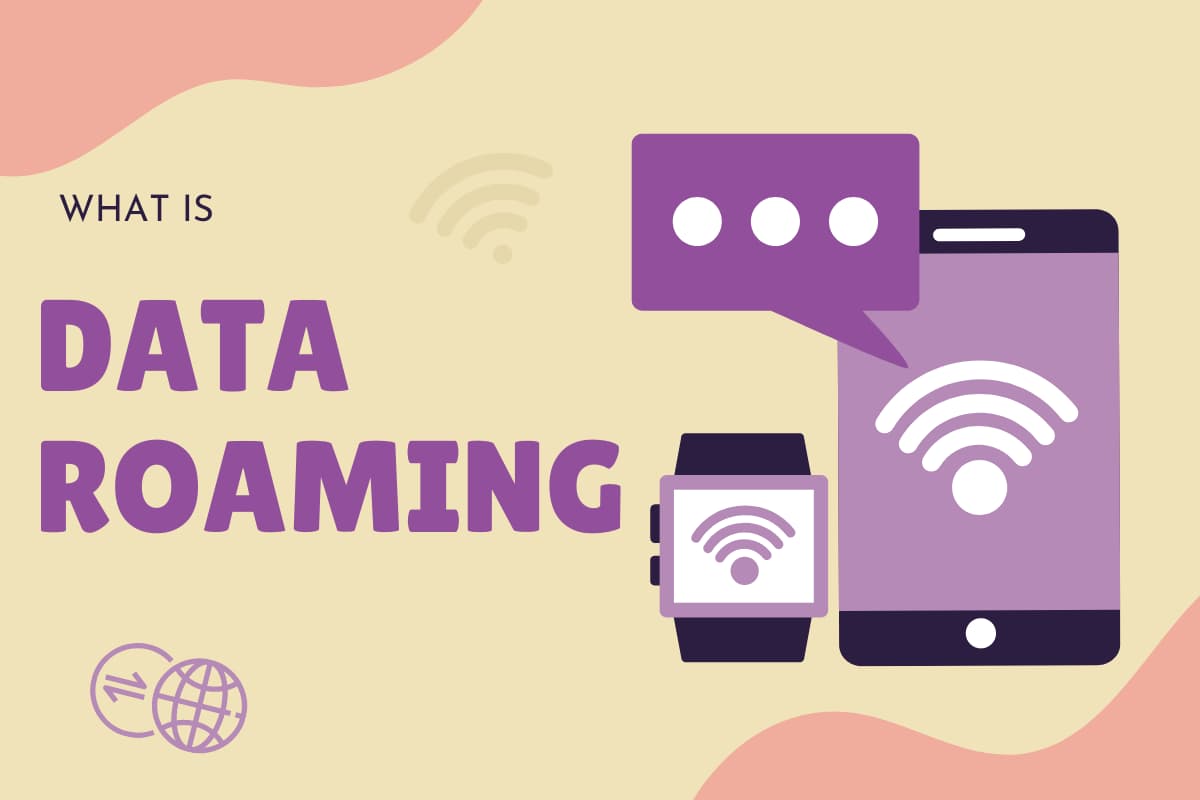In today’s interconnected world, staying connected while traveling is essential. However, the convenience of using your mobile phone abroad can come with a hefty price tag in the form of roaming charges. This article aims to demystify the concept of mobile roaming and data roaming charges, providing you with the knowledge and tools to make informed decisions and avoid bill shock while exploring the globe.
What is Data Roaming?

Data roaming is further a service that enables a person who is using their mobile telephone to use the Internet, send messages and make calls when the user is in another country or region where their home network is unavailable. When you are ‘ Roaming’, it means your phone connects to a different network and you pay for that network.
How to Switch on Data Roaming on Android Phones
Enabling data roaming on your Android phone is a straightforward process, but it’s important to do so cautiously to avoid unexpected charges.
- Open the Settings app.
- Tap on Network & internet or Connections.
- Tap on Mobile network.
- Turn on the Data roaming toggle switch.
How to Switch on Data Roaming on iPhones
For iPhone users, activating data roaming involves a similar process.
- Open the Settings app.
- Tap on Cellular or Mobile Data.
- Tap on Cellular Data Options or Mobile Data Options.
- Turn on the Data Roaming toggle switch.
What are Roaming Charges?
Roaming charges are those charges that are incurred for the use of a mobile phone while roaming. These charges can encompass various services, including:
- Data usage: Charges for browsing the internet, using apps, and downloading files.
- Calls: Charges for making and receiving calls while roaming.
- Texts: Charges for sending and receiving text messages while roaming.
The specific tariffs for these services are rather controversial and depend on your network provider as well as the country you are in. It’s also important to find out how much your service provider is going to charge you once you are in a roaming zone so that you can budget yourself appropriately.
Has Brexit Affected Roaming Charges?

Prior to Brexit, EU roaming regulations guaranteed no extra roaming fees for UK travelers using their mobile plan in other EU countries. However, when the Brexit transition period ended on January 1, 2021, the UK left the EU single market and no longer had to comply with EU roaming rules.
As a result, mobile providers in the UK (EE, O2, Vodafone and Three) are allowed to reintroduce roaming fees for customers traveling in the EU. Several major networks have taken advantage of this change and now charge additional roaming charges for calls, texts, and data use on trips to EU countries. For many British travelers, this extra cost burden has made roaming within Europe more expensive post-Brexit.
Roaming in the EU
When making a holiday trip to the EU, if you are a UK citizen, you need to understand the possible charges that you might be charged when using your phone in another country. Whereas some of the networks may still have friendly roaming offers that enable you to use your packages at the cost of your UK package while in the EU, some may even charge you separately for calls, texts, or data.
As a means of precaution, it is recommended that before going out you find out whether your network provider charges you a roaming fee in the EU. There are also other solutions which include buying a local SIM card or an eSim because roaming charges are expensive. Also, try to use Wifi most of the time to avoid being charged for the use of data frequently and cut on the expenses.
Roaming Outside the EU
EU residents will be excited when traveling in another country that has not been listed under the EU because there is a very high chance that they will experience roaming charges. Such charges can be very high so one should be ready and look for ways to reduce the amount of charges possible.
Check Out Our Range of Travel eSIM Deals
So if you have an idea to travel, and you want to save billions of money while traveling and at the same time want to stay connected do visit our Travel eSIM deals with Gigago. If you’re looking for an alternative to the typical SIM cards then you should consider eSIMs as they will allow you to avoid the high costs of roaming charges.

How to Avoid Roaming Charges

Roaming charges might be an issue of great concern in the following ways; some strategies may be adopted in a bid to prevent or even eradicate these charges. It is therefore important to be informed when traveling so that you do not end up being charged an arm and a leg for using the services of communicating while on the road
1. Use free Wi-Fi whenever you can
The current world has adopted the use of Wireless Fidelity more commonly known as Wi-Fi in many public areas including hotels, cafes, airports, and sometimes even in public transport. These are the recommended free Wi-Fi hotspots to ensure that the user surfs the internet, and checks his or her emails or social networks without reaching out for the mobile data.
2. Check if your network offers a roaming add-on
Some of the network providers have roaming add-ons or just bundles that include a specific amount of data, minutes, and outgoing messages to be used while roaming at an affordable price. These add-ons can be preferable to paying standard tariffs for roaming as in cases with moderate usage they amount to considerably lower prices.
3. Don’t opt out of your networks’ usage caps
A lot of networks have usage limits in the use of the networks to ensure that customers are not unnecessarily charged for the use of the networks in the most expensive regions. These caps define the maximum amount that one can be charged for roaming usage within a given billing period. Despite the bait to remove the caps for unlimited usage, it is wise not to do so because the shocking bill can be something you’ll never expect.
4. Consider buying a local SIM or eSIM
If you’re going to a specific country for a long time or expect to use the internet a lot, buying a SIM card or an eSIM will be more economical. Local SIM cards allow you to get connected at local tariff for voice calls, text, as well as data, eSIMs are digital SIMs that can be downloaded to your device instantly.
5. Check whether your destination is bound by any regulations
There are also laws in some countries to regulate the amount of money that the networks can demand from their clientele for the use of roaming. To ascertain that traveler is not overcharged, it is advisable to find out more about the laws in the country of destination.
The tips and data usage considerations that have been provided in this article should help everyone to make their travel connected while avoiding high roaming charges.
Which is cheaper, a prepaid SIM card or an international SIM card?
In the broadest sense, the prepaid SIM card usually will cost you less than an international SIM card. Mobile SIM cards which are commonly known as pay-as-you-go SIM cards are normally associated with a particular country or a specific region and of course, provide local call, message, and internet charges. You can get them at airport shops, convenience stores, and mobile phone shops within the country you are visiting.
On the other hand, now there is an international SIM card that is designed for use in several countries and therefore may be more versatile. They are normally more costly than prepaid SIM cards and at times; they are simulated on data usage or validity period.
However, the decision as to which one is the best for you will depend on your situation as well as your travel plans. If you are going to one country for a short time and think that you will need only an average amount of data, it’s beneficial to choose a prepaid SIM card. That being said, in case you are planning to travel to different countries or you are going to use significantly more data and telephone calls, an international SIM card might be more beneficial for you even if the cost would be significantly higher.
Should I keep data roaming on or off on my phone?

In any case, it is recommended to disable the use of data roaming on the phone when you are in a foreign territory that is out of your home network service area. This measure can prevent you from using up a lot of money in roaming charges that you never thought of in the first place because you made a minor wrong turn on your trip.
What is my network’s roaming policy?
It is therefore important that one learns the behavior of their network when they are in another country so that they do not find a surprise in their phone bill. Here’s a brief overview of the roaming policies of some major UK networks:
Three: Those three offers included roaming in 71 international locations. This means that you could freely use all your allowance of data, calls, and texts you subscribed for in the UK in those destinations for free.
EE: EE has provided favorable roaming for everyone in 47 European locations. The data, calls, and texts that you included in your monthly allowance can be used in these destinations at no additional cost. However, there are some guidelines that are normally referred to as ‘fair usage policy’ that one should consider.
O2: EU roaming is inclusive of O2. You can also use data, voice calls and texts included in your tariffs for the UK in the EU for the same cost. However, there are several FULs that you ought to know about before signing up for such a satisfactory offer.
Vodafone: To further this, Vodafone boasts of a special kind of roaming that does not charge users for local calls in 51 locations across the globe. This is to mean that regardless of the destinations you will be using your UK allowance of data, calls, and texts at no cost.
Sky Mobile: EU roaming is included in the package that Sky Mobile provides. While in EU, you can use your UK allowance of data, calls, and texts as usual without any extra charges. However, there are some limitations that are normally associated with fair usage policy which include;
How does fair usage work with roaming allowances?
To avoid misuse of free-roaming limits, there are measures put in place by the network providers in the form of fair usage policies. Such policies define the number of data, calls, and text that you are allowed to use any time you are roaming within a given period which is normally in terms of one month or cycles of your billing period.
Roaming usage beyond these fair usage limits will attract other charges for your roaming usage hence the need to manage your usage. These again may differ from one network provider to another and from one plan to another with specific limits and charges being put in place. Also, one should ensure they know the fair usage policy of the network in case they are to travel to another country.
Where can I use my allowances for no extra charge?
The places where the usage of allowances before the tariff charges will come extra will differ from one network service provider to another. Thus, it is recommended to clarify with your network provider concerning the places that are included in the free-roaming.
Final Thoughts
I hope this comprehensive guide is effective in your understanding of mobile roaming and data roaming charges, empowering you to make informed decisions and stay connected affordably while traveling. Remember, preparation and awareness are key to avoiding unexpected expenses and enjoying a seamless communication experience wherever your adventures take you.

